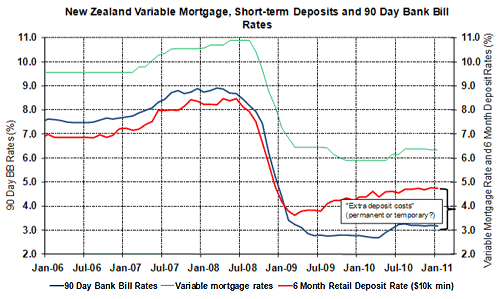

By Roger J Kerr
The OCR is reviewed again by the RBNZ this Thursday and again there will be no change.
The moneymarkets have progressively moved the timing of the next OCR increase from March/April to July/September since the downbeat December MPS statement from the RBNZ and the negative September 2010 quarter’s GDP result just before Xmas.
Mr Bollard has clearly stated that the RBNZ will not be increasing official interest rates until they see firm evidence of a sustained pick-up in economic activity this year.
He will also know that that this approach runs a high risk of another monetary policy management mistake being made this year, due to the extreme lag in receiving GDP figures from Statistics NZ (i.e. March 2011 quarter’s data coming out in late June 2011).
By the time the RBNZ see proof of +3% GDP growth in 2011, the inflationary pressures will already be well advanced and they will be forced to increases official interest rates faster and in larger steps than what otherwise would be the case.
The art of monetary policy management is to pre-empt stronger growth (thus higher inflation risks) with pre-emptive adjustments to monetary conditions, as they take 12 to 18 months to have impact. The sad reality is that the RBNZ now have very little confidence in the accuracy of their own GDP growth forecasts, having been so far way from reality with their 2010 growth forecasts.
They are now waiting for hard evidence of stronger growth in 2011 before lifting the OCR.
They will find themselves well behind the 8-ball in this respect and will be forced to catch up in a hurry in the second half of the year. The risk and damage to the economy from this anticipated monetary policy mis-judgement will be via resultant exchange rate movements, not market interest rate movements.
Lifting the OCR from 3% to 5% later this year will only bring official interest rates in line with where the actual market price for borrowing and investing money (interest rates) has been for 12 months already - that is, 5%.
The banks’ combined cost of funds will not change due to the OCR increasing, their funding costs are already established at 5% to 6% and will remain there through this year. The OCR increases this year will have no impact on the domestic economy through investor/borrow/consumer behavioural changes, as their market interest rates will not change much.
The only thing a fast and furious OCR lift from June/July onwards will do is to attract speculative buyers of Kiwi dollars in the FX markets as the “NZ monetary tightening” headlines hit the global newswires. So the Kiwi dollar appreciates on its own accord in the second half of the year and the clobbered exporters wonder why the RBNZ allowed this monetary policy sloppiness to occur.
The RBNZ’s problem and predicament goes back to early 2009 when they slashed the OCR to 2.50% and then introduced the Core Funding Ratio regulation on the banks. The RBNZ should never have allowed the OCR to get so far below true market interest rate levels.
Yet again, the export sector is likely to pay the price for this monetary policy boo-boo.
The blue lined (see chart below) 90-day wholesale interest rates (which track the official OCR rate) will increase in the second half of 2011. However the banks’ cost of funds (red-lined retail deposit rates) will not change too much as a result.

--------------------
* Roger J Kerr runs Asia Pacific Risk Management. He specialises in fixed interest securities and is a commentator on economics and markets. More commentary and useful information on fixed interest investing can be found at rogeradvice.com
No chart with that title exists.
8 Comments
Actually I think Bollard needs to stop pandering to the banks...he needs to raise the ocr by a half percent and keep doing so all the way to 5.5% asap. That would squeeze out the poo in the bank balance sheets..force the sale of dead assets...clear the market of the poor use of capital and encourage savers to go at it 110%. In no time we would see property being affordable...spending would resume...building start to recover. Enough of the silly cheaper for longer BS Bollard. Do something constructive.
Wolly, that's the policy of fools. A recipe for double digit unemployment and a prolonged depression. Property affordability will do nothing for the economy if it is cheaper to buy than build - nothing gets built, nothing gets upkept, no money (or jobs) are spent in the economy and insurance payouts (ChCh) are not spent on rebuilding - just cashed in.
This is the scenario in the US rust belt and in small town NZ and cities like Invercargill etc. It didn't matter that land is essentially free and houses were not much more. A house was/is worth little so a coat of paint would over capitalise it.
You are asking Bollard to do something destructive. Unnecessarily high interest rates will cause a depression that could last generations - Bollard is starting to realise this - but only after his balls ups of the past decade.
Conversely Roger Kerr is still deluded by his own self righteousness. His published opinions and their overwhelming inaccuracy are testament to that. Was he not anticipating 3 or 4% growth in 2010 - and what we most likely got was 0.5% with an H2 recession?
ChrisJ
Isn't it just the cold hand of capitalism? We have too much debt and are losing 37 billion a year in interest payments. The debt never should have been allowed to get out of hand but it has and the debate should be about how we do it with the least amount of pain. The longer the RB intervenes to keep interest rates low the more misallocation of resources will occur and the bigger the problem.
I dont think you can stop the 'great correction' and I believe the quicker and sooner it's over with the quicker we get to create some real wealth.
I with Wolly on this one, I dont think you can stop the tide but good luck anyway. I think from now on it would be better if the market set interest rates, like it or leave it.
I like ir when Wolly posts good solid opinion rather than his usual flipant comments.
He actually makes sence so often when he does.
We do live in a strange time, when the OCR doesnt reprent the market, and being so far below is not an effective tool....so far any movement would have to be very dramatic...whole % rather than % pionts.. FoThere is rar more than 1 reason to lift the OCR.....IF the bank where made not to increase their rates using the OCR as an excuse.
Dr Bollard has got to be aware of this conundrum he faces, he is a very competent Central Banker .
He really does need to stop pandering to the large Banks, who must face up to the fact that some loans, where they lent like drunken sailors , are going to go bad if faced with market related interest costs .
Right now there is no incentive to save with depositors interest rates at just over 4%, tax taking a third and inflation at near 4% , anyone placing money in the bank is actually losing money
" The OCR increases this year will have no impact on the domestic economy through investor/borrow/consumer behavioral changes, as their market interest rates will not change much."
How can this be true when so many people are now borrowing on floating rate mortgages or very short term fixed. ORC increases will directly affect this large population group and instantly result in less disposable income driving the domestic economy
"The art of monetary policy management is to pre-empt stronger growth (thus higher inflation risks) with pre-emptive adjustments to monetary conditions, as they take 12 to 18 months to have impact"
Not any more, now we have some many people on floating mortgages the impact will be immediate. Which is why I believe Bollard is correctly biding his time.
Julz - what I think Roger is referring to is that when the OCR rises, deposits rates won't to the same extent. That means that the spread the banks have to pay for funding (OCR at 3.20% but depo rates higher at 4.5%) will reduce, and provided they pass that back to the borrower (and I believe they mostly will) the rise in rates might not be as steep.
Julz - what I think Roger is referring to is that when the OCR rises, deposits rates won't to the same extent. That means that the spread the banks have to pay for funding (OCR at 3.20% but depo rates higher at 4.5%) will reduce, and provided they pass that back to the borrower (and I believe they mostly will) the rise in rates might not be as steep.

We welcome your comments below. If you are not already registered, please register to comment
Remember we welcome robust, respectful and insightful debate. We don't welcome abusive or defamatory comments and will de-register those repeatedly making such comments. Our current comment policy is here.